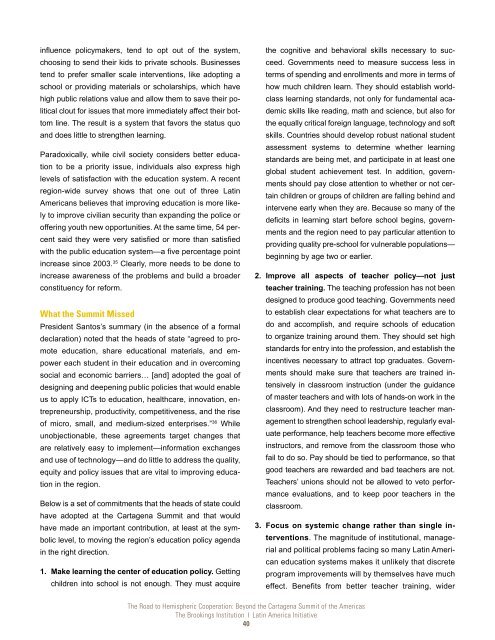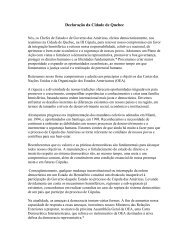The Road to Hemispheric Cooperation: Beyond the Cartagena
The Road to Hemispheric Cooperation: Beyond the Cartagena
The Road to Hemispheric Cooperation: Beyond the Cartagena
Create successful ePaper yourself
Turn your PDF publications into a flip-book with our unique Google optimized e-Paper software.
influence policymakers, tend <strong>to</strong> opt out of <strong>the</strong> system,<br />
choosing <strong>to</strong> send <strong>the</strong>ir kids <strong>to</strong> private schools. Businesses<br />
tend <strong>to</strong> prefer smaller scale interventions, like adopting a<br />
school or providing materials or scholarships, which have<br />
high public relations value and allow <strong>the</strong>m <strong>to</strong> save <strong>the</strong>ir political<br />
clout for issues that more immediately affect <strong>the</strong>ir bot<strong>to</strong>m<br />
line. <strong>The</strong> result is a system that favors <strong>the</strong> status quo<br />
and does little <strong>to</strong> streng<strong>the</strong>n learning.<br />
Paradoxically, while civil society considers better education<br />
<strong>to</strong> be a priority issue, individuals also express high<br />
levels of satisfaction with <strong>the</strong> education system. A recent<br />
region-wide survey shows that one out of three Latin<br />
Americans believes that improving education is more likely<br />
<strong>to</strong> improve civilian security than expanding <strong>the</strong> police or<br />
offering youth new opportunities. At <strong>the</strong> same time, 54 percent<br />
said <strong>the</strong>y were very satisfied or more than satisfied<br />
with <strong>the</strong> public education system—a five percentage point<br />
increase since 2003. 35 Clearly, more needs <strong>to</strong> be done <strong>to</strong><br />
increase awareness of <strong>the</strong> problems and build a broader<br />
constituency for reform.<br />
What <strong>the</strong> Summit Missed<br />
President San<strong>to</strong>s’s summary (in <strong>the</strong> absence of a formal<br />
declaration) noted that <strong>the</strong> heads of state “agreed <strong>to</strong> promote<br />
education, share educational materials, and empower<br />
each student in <strong>the</strong>ir education and in overcoming<br />
social and economic barriers… [and] adopted <strong>the</strong> goal of<br />
designing and deepening public policies that would enable<br />
us <strong>to</strong> apply ICTs <strong>to</strong> education, healthcare, innovation, entrepreneurship,<br />
productivity, competitiveness, and <strong>the</strong> rise<br />
of micro, small, and medium-sized enterprises.” 36 While<br />
unobjectionable, <strong>the</strong>se agreements target changes that<br />
are relatively easy <strong>to</strong> implement—information exchanges<br />
and use of technology—and do little <strong>to</strong> address <strong>the</strong> quality,<br />
equity and policy issues that are vital <strong>to</strong> improving education<br />
in <strong>the</strong> region.<br />
Below is a set of commitments that <strong>the</strong> heads of state could<br />
have adopted at <strong>the</strong> <strong>Cartagena</strong> Summit and that would<br />
have made an important contribution, at least at <strong>the</strong> symbolic<br />
level, <strong>to</strong> moving <strong>the</strong> region’s education policy agenda<br />
in <strong>the</strong> right direction.<br />
1. Make learning <strong>the</strong> center of education policy. Getting<br />
children in<strong>to</strong> school is not enough. <strong>The</strong>y must acquire<br />
<strong>the</strong> cognitive and behavioral skills necessary <strong>to</strong> succeed.<br />
Governments need <strong>to</strong> measure success less in<br />
terms of spending and enrollments and more in terms of<br />
how much children learn. <strong>The</strong>y should establish worldclass<br />
learning standards, not only for fundamental academic<br />
skills like reading, math and science, but also for<br />
<strong>the</strong> equally critical foreign language, technology and soft<br />
skills. Countries should develop robust national student<br />
assessment systems <strong>to</strong> determine whe<strong>the</strong>r learning<br />
standards are being met, and participate in at least one<br />
global student achievement test. In addition, governments<br />
should pay close attention <strong>to</strong> whe<strong>the</strong>r or not certain<br />
children or groups of children are falling behind and<br />
intervene early when <strong>the</strong>y are. Because so many of <strong>the</strong><br />
deficits in learning start before school begins, governments<br />
and <strong>the</strong> region need <strong>to</strong> pay particular attention <strong>to</strong><br />
providing quality pre-school for vulnerable populations—<br />
beginning by age two or earlier.<br />
2. Improve all aspects of teacher policy—not just<br />
teacher training. <strong>The</strong> teaching profession has not been<br />
designed <strong>to</strong> produce good teaching. Governments need<br />
<strong>to</strong> establish clear expectations for what teachers are <strong>to</strong><br />
do and accomplish, and require schools of education<br />
<strong>to</strong> organize training around <strong>the</strong>m. <strong>The</strong>y should set high<br />
standards for entry in<strong>to</strong> <strong>the</strong> profession, and establish <strong>the</strong><br />
incentives necessary <strong>to</strong> attract <strong>to</strong>p graduates. Governments<br />
should make sure that teachers are trained intensively<br />
in classroom instruction (under <strong>the</strong> guidance<br />
of master teachers and with lots of hands-on work in <strong>the</strong><br />
classroom). And <strong>the</strong>y need <strong>to</strong> restructure teacher management<br />
<strong>to</strong> streng<strong>the</strong>n school leadership, regularly evaluate<br />
performance, help teachers become more effective<br />
instruc<strong>to</strong>rs, and remove from <strong>the</strong> classroom those who<br />
fail <strong>to</strong> do so. Pay should be tied <strong>to</strong> performance, so that<br />
good teachers are rewarded and bad teachers are not.<br />
Teachers’ unions should not be allowed <strong>to</strong> ve<strong>to</strong> performance<br />
evaluations, and <strong>to</strong> keep poor teachers in <strong>the</strong><br />
classroom.<br />
3. Focus on systemic change ra<strong>the</strong>r than single interventions.<br />
<strong>The</strong> magnitude of institutional, managerial<br />
and political problems facing so many Latin American<br />
education systems makes it unlikely that discrete<br />
program improvements will by <strong>the</strong>mselves have much<br />
effect. Benefits from better teacher training, wider<br />
<strong>The</strong> <strong>Road</strong> <strong>to</strong> <strong>Hemispheric</strong> <strong>Cooperation</strong>: <strong>Beyond</strong> <strong>the</strong> <strong>Cartagena</strong> Summit of <strong>the</strong> Americas<br />
<strong>The</strong> Brookings Institution ❘ Latin America Initiative<br />
40








